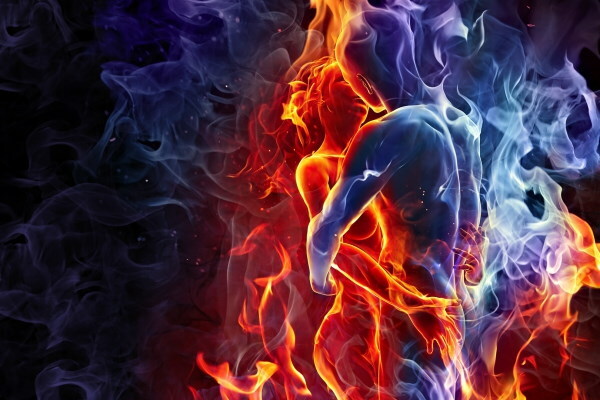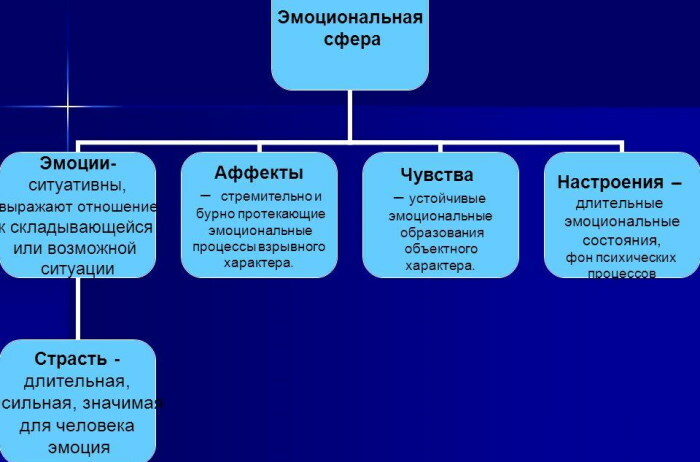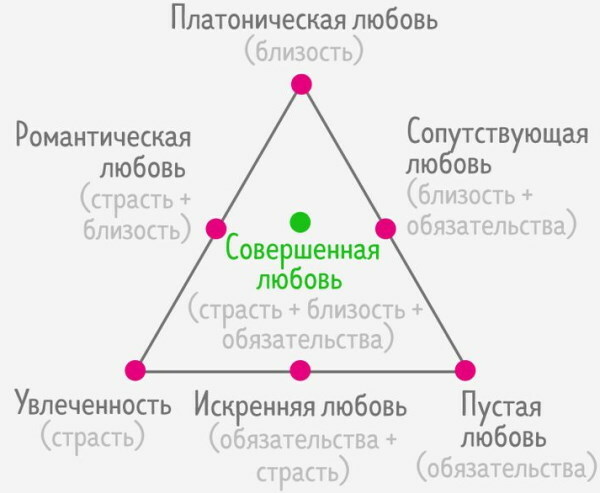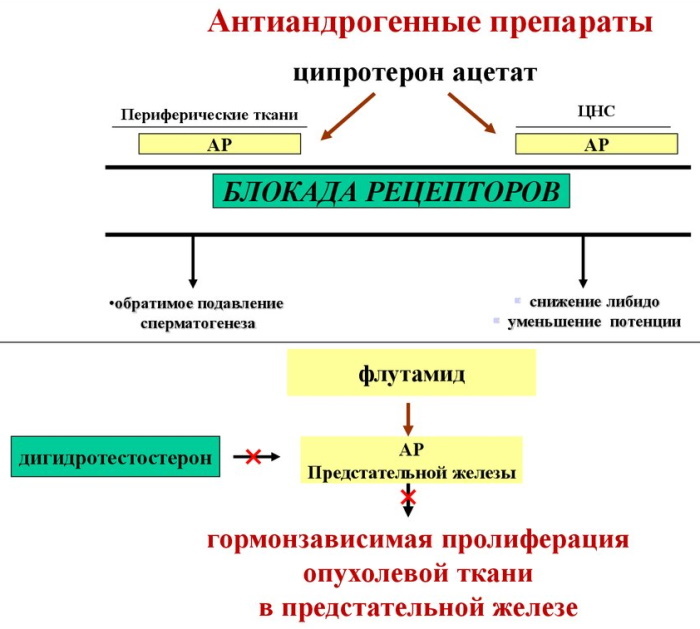Content
- Definition
- Functions and role
- What lies behind
- How is it born
- Why and how it goes
- How does it manifest
- What is different from love
- Videos about passion in psychology
The term "Passion" in psychology refers to the dominant emotion that absorbs the personality. Is not only attraction to a person. And, for example, to a certain type of activity. Initially, this concept appeared in ancient Greek philosophy. Zeno, the founder of the Stoic school, called the disorderly impulse of the soul passion.
Definition
Passion (in psychology it is synonymous with the words "affect", "emotion") is characterized by persistence. It determines the behavior of a person at a particular stage of life. This term originated in ancient Greek philosophy and underwent many transformations. Passion has been interpreted in different ways. This is easy to see if you trace the formation of psychology, which separated from philosophy into an independent science.
| Direction, researcher | Characteristics of the teaching | Definition of the term "Passion", according to the teachings |
| Stoicism | The School of Philosophy, formed in Athens around 300 BC BC NS. Founder - Zeno of Kiti. The teachings and views of the school spread to the Roman and Greek lands. Ideas remained relevant until the 3rd century. BC NS. | Excessive and uncontrollable impulse of the soul. It is not controlled by reason, it goes against human nature. |
| Cicero Mark Tullius | Orator, scientist, Roman politician, philosopher. Partially shared the views of stoicism. | Any passion is a disease. People with such emotions suffer from mental disabilities. A person striving for health must destroy inner passions. |
| Platonism | Theories of forms of cognition of the world, man and his relationship with nature. The founder is Plato. | Plato gave a contradictory definition. So, in the book "Timaeus" he emphasizes that passions are not characteristic of the sublime part of the soul. In his work "Republic", on the contrary, he asserts that each side of a person's inner world has certain emotions. |
| Aristotelianism | The founder is Aristotle. He built a system of thinking based on the interpretation of ethics, politics, and the inner world of a person. | The Nicomachean Ethics book describes passions as a collection of emotions. This includes lust, joy, anger, friendship. They are all neutral. Therefore, they should be used in moderation, without disturbing the inner balance of a person. |
| Denis Diderot | French philosopher and educator, writer, honorary member of the St. Petersburg Academy of Sciences. | Desires, needs, disgust are at a high point of intensity. A strong feeling, because of which personal freedom is lost, and a person becomes obsessed with any idea, object. |
In addition to philosophers and psychologists, the concept of passion is also interpreted in religious teachings.
In Christianity, the most sinful feelings fall under this term:
- Pride.
- Fornication.
- Despondency.
- Gluttony.
- Vanity.
- Love of money.
In the Eastern Byzantine teaching, any aspiration of the soul that carries a person and distracts him from love for God is considered a passion. This is regarded as a sin and addiction. If we evaluate other religious teachings, then passion takes either a morally neutral position (in Catholicism) or is one of the basic conditions of a person (Hinduism).
Almost all schools and thinkers (including religious ones) advise to struggle with passions, to deny them. However, there is another point of view on this emotion. German philosopher Friedrich Nietzsche believed that passion cannot be contained. He was critical of the Christian policy of suppressing this kind of emotion. As the philosopher believed, passion would then take on more dangerous forms and spill out in the form of reactive feelings. For example, hatred, anger.
Sigmund Freud also has a positive description of passion. He believed that, like any other emotion, this energy is worth exploiting. For example, use in science, in the creation of cultural objects. Paul Michel Foucault, a French theorist, saw passion as a manifestation of insanity. He compared her with drugs, alcohol, vices.
Modern psychology provides the most accurate definition of passion. So, this word is called the emotional state of a person. It determines his behavior at that stage of life when emotions dominate his mind. Passion can elevate everything positive in a person or produce a destructive effect.
Specific traits:
- Feeling has a pronounced focus and stability.
- The forces and thoughts of a person are concentrated to achieve a single goal.
- The object of passion is a type of activity, occupation or person.
Thus, this description is used to define passion in a modern interpretation.
Functions and role
Passion (this is always the engine in psychology) prompts a person to take any action. From this follows a number of functions that are characteristic of a person who is under the influence of such a strong emotion.
These include:
- Regulation. A person deliberately controls psychological processes, personal emotional manifestations. All of them have the status of subordination, since they must serve a single purpose.
- Expression. A person expressively conveys his experiences, feelings and emotions.
- Synthesis. All disparate feelings are woven together.
- Grade. A person gives a description of his capabilities. This helps to establish the further path of movement. So, in order to achieve the desired, one has to realistically assess personal qualities, eliminate shortcomings.
- Incentives. Passion makes a person do things, take any action.
- Meaning formation. A person has a certain meaning. It is understandable, it has clear boundaries.
-
Revitalization. A person moves from theory to practice. He does things, works, does everything to achieve what he wants.

Passion for work or science allows for new discoveries. This emotion acts as the engine of progress. On the other hand, this feeling can have a destructive effect on the psyche. After all, often passion flows into obsession - its negative side.
In relationships between people, when passion is directed towards a living object, this emotion contributes to a vivid expression of feelings. The impact on a person's life depends on his mental health.
In mentally ill people, passion can have different outlines. For example, in some it causes an irresistible urge to kill. Passion will not harm psychologically healthy people. On the contrary, it will be the engine for new discoveries. A person will concentrate all his forces around the object of passion and will do everything possible to achieve the goal.
What lies behind
At the heart of passion lies an unnatural human desire and attraction. Their strength in comparison with the usual state of the personality is much greater. Emotions irritate the sensitive part of the human psyche.
Another component of passion is a high tone of feeling. It is much higher than the normal physiological indicator. When combined, attraction and feelings contribute to the fact that a person loses his original tone.
That is why from the outside it seems that the personality has become different: the manner of behavior has changed, the attitude to the events taking place and the reaction to them have changed. In some cases, aggression is manifested, which comes out if the actions of others interfere with the achievement of the goal of the obsessed with passion.
It cannot be denied that passion is based on the mind and imagination of a person. It is they who contribute to the activity of the individual. So, she uses all the possibilities of her mind, imagination and fantasy to get closer to what she wants.
Together with the soul and feelings, the mind receives pleasure from the embodiment of the conceived into reality. From this, a person becomes more sensitive, passionate. Thoughts about one thing make the mind to be in constant motion. He is the source of thoughts, subsequent actions aimed at satisfying needs.
Fortitude is no less important component. The will of a person is completely subordinate to passion and becomes hedonic, carnal, or takes another form.
However, according to the works of M. Weber, N. Elias, M. Foucault, passion is based on self-control. Researchers have refuted the theory that it was said about the suppression of emotions using capitalism. On the contrary, a person who does not hold back passion, without knowing it, learns self-control. Some desires and needs cannot be accepted by society (for example, passion in intimacy), so a person develops self-discipline. And this is much more effective than an external ban.
How is it born
Passion (this concept in psychology has different formulations) goes through several stages. Initially, a person takes an interest in the object. This can best be traced to the example of 2 people. Most often, passion will arise in friendships that last no more than 2 weeks. For example, people met and started communicating. If they are close in looks, and appearance causes attraction, then the risk of passion is great.
This happens spontaneously, provided that one of the partners is sympathetic to the other. And vice versa, people can communicate for a long time, know each other for many years, but the spark between them will never break out. There is a chance for love to arise, but not passion. It is possible that one of the partners secretly dreamed of a girlfriend (friend), idealized the image of a person and was in anticipation.
For a long time, the mind and fantasy elevate the desire to possess this person to the highest degree. And when this object shows sympathy or gives some sign of reciprocity, a mechanism is triggered. After waiting, the activation phase begins. Passion arises because now all desires accumulated over a long time can come true. This gives inspiration to a person, feelings absorb him.
Passion in any activity has a different side of development. Any person has talents. Their highest point is giftedness. Along with this, a person can show a strong interest in any area or not. If giftedness coincides with the interest of the individual, then the person becomes passionate. This can manifest itself at any age. Sometimes people are passionate about the work of a lifetime and spend many years on achieving goals.
Why and how it goes
In psychology, passion is, first of all, an emotion. And as is their nature, they can come and go. Their presence in human life is fickle. Therefore, passion is a temporary phenomenon. This rule applies to feelings for another person.
Passion is a response to the existential needs of the organism of a living being. During the period when a person is exposed to this emotion, many substances that act like drugs are produced inside him. Being under their influence, the person experiences elation, she is emotionally excited. All actions, actions are aimed at indulging the needs.
When a person gets what he wanted or achieves what he wants, the phase of pleasure begins. He is satisfied with what is happening. The realization that the goal has been achieved gives a lot of positive emotions. Thanks to the secreted hormones, all the senses are heightened.
However, passion is an unnatural state of the body. The constant maintenance of such a gamut of feelings takes a lot of resources. And this is a very costly business, and it cannot last for a long time.
Otherwise, there is a risk of burnout, which will necessarily follow after the end of the passion. To prevent such a drastic change, the body has developed a defense mechanism - it simply limited the time of passion, not endowing it with constancy.
When a person has mastered the subject of passion, he is under the influence of hormones for a short time. After the active phase, there is a gradual awareness of what has happened. A person gives a real assessment of what happened, accepts the fact of action. At this time, the body produces less and less hormones, gradually bringing their level closer to the natural state.
After that, the person returns to normal life. He is no longer tormented by an obsessive desire or need, since they have been satisfied. It is for this reason that psychologists regard passion as a sign of selfishness. Since a person, first of all, thinks about himself and his desires, and not about his soul mate.
Passion passes painlessly or leaves a person devastated. In the first variant, the person was most often obsessed with passion for a short time. For example, in a relationship, it lasts 2-3 years or less. After passing through such a stage in life, a person enters the previous rut without moral worries.
In the case when passion was an obsession and lasted for a long time (for example, 10 years), then even after achieving the desired, the person does not feel a sense of satisfaction. The person feels joy and all the accompanying emotions during the passion, but when it passes, he remains empty. This phenomenon is similar to the meaning of existence that a person has lived for a long time.
Passion became a habit, shaped a way of life, behavior and needs. When the goal has been achieved, the person does not understand how to proceed. After all, all the previous years, passion ruled his life. When she was gone, actions and motives lost their meaning. Often such people fell into depression and apathy. A psychotherapist helped them in overcoming difficulties.
How does it manifest
Passion (this is also called affect in psychology) lends itself to study not only from a theoretical point of view. During the period when a person is under the influence of strong emotions, his brain actively uses the dopamine system. This was found out thanks to the MRI.
With the help of this device, it was possible to photograph the active areas of neurons in real time. The joyful state of a person was achieved by developing the hormone of happiness. To experience pleasant emotions, brain activity focuses attention on the desired goal, develops motives.
The dopamine structure is able to control human movements, the activity of the cardiovascular, endocrine and digestive systems. She develops an addiction to things that bring joy. So, dopamine produced by the brain contributes to the fact that a person concentrates all his attention on the object of passion. Along with this, there is a surge of energy, a desire to possess an object (living being). The amount of serotonin also increases.
When his indicators are normal, then emotions do not cause problems for a person. In a state of passion, serotonin levels are off the charts. This leads to a natural obsession with the desired object.
The processes taking place inside the body affect a person's life, his behavior, and his manner of speaking. A person who is under the yoke of passion denies any goals that will distract him from what he wants. All actions and actions are unconsciously controlled by needs.
The negative side of this phenomenon is that a person underestimates real problems. Existing troubles in life are devalued. Until the main goal is achieved, everything becomes insignificant. Only the object of passion has priority.
What is different from love
You can distinguish passion from love by the following features:
- In a relationship, a person prefers physical intimacy to an intellectual pastime.
- The true feelings of a person are hidden. He only focuses on his fantasies.
- A person wants to control the object of passion, to possess it alone.

If you follow the behavior of a person subject to passion, then you can highlight the main features:
- The pupils are enlarged (especially in a rush of passion).
- The movements of the arms and body are fast and nervous.
- The timbre of the voice is raised. The person speaks very quickly, the phrases are sometimes confused.
- The obsession with the idea makes all conversations to be reduced to the object of passion.
- Increased excitability.
In psychology, passion is described as a destructive or uplifting feeling. In any case, it is the engine that prompts a person to take action. In modern science, this term denotes emotions that are inherent in any person. There is nothing shameful or unnatural in the fact that a person succumbs to passion. The main thing is that he can control himself, avoiding the harmful influence of this feeling on his own life.
Videos about passion in psychology
Psychologist about passion:



